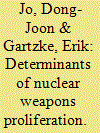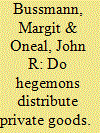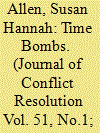|
|
|
Sort Order |
|
|
|
Items / Page
|
|
|
|
|
|
|
| Srl | Item |
| 1 |
ID:
077072


|
|
|
|
|
| Publication |
2007.
|
| Summary/Abstract |
Nuclear weapons proliferation is a topic of intense interest and concern among both academics and policy makers. Diverse opinions exist about the determinants of proliferation and the policy options to alter proliferation incentives. We evaluate a variety of explanations in two stages of nuclear proliferation, the presence of nuclear weapons production programs and the actual possession of nuclear weapons. We examine proliferation quantitatively, using data collected by the authors on national latent nuclear weapons production capability and several other variables, while controlling for the conditionality of nuclear weapons possession based on the presence of a nuclear weapons program. We find that security concerns and technological capabilities are important determinants of whether states form nuclear weapons programs, while security concerns, economic capabilities, and domestic politics help to explain the possession of nuclear weapons. Signatories to the Treaty on the Non-Proliferation of Nuclear Weapons (NPT) are less likely to initiate nuclear weapons programs, but the NPT has not deterred proliferation at the system level.
|
|
|
|
|
|
|
|
|
|
|
|
|
|
|
|
| 2 |
ID:
077069


|
|
|
|
|
| Publication |
2007.
|
| Summary/Abstract |
According to power-transition theory, war is most likely when the leading state is challenged by a rapidly growing, dissatisfied rival. Challengers are said to be dissatisfied because the hegemon manages the status quo for its own benefit, rewarding its allies and penalizing rivals. We assess the leading state's ability to distribute the private goods of peace, victory in war, and economic prosperity. States with alliance portfolios similar to the hegemon's are not protected from aggression; nor do they grow more rapidly than countries with which the leading state is not closely allied. The dominant power's allies are more apt to win defensive wars, although the means by which this is accomplished are unclear. On balance, our results call into question the ability of the leading state to engineer satisfaction by distributing private goods. Like hegemonic-stability theory, power-transition theory exaggerates the influence of the leading state over the international system.
|
|
|
|
|
|
|
|
|
|
|
|
|
|
|
|
| 3 |
ID:
077071


|
|
|
|
|
| Publication |
2007.
|
| Summary/Abstract |
Scholars have devoted considerable attention to the informational role of international institutions. However, several questions about the informational aspects of institutional behavior remain underexplored: What determines how audiences respond to institutional decisions? Through what channels does information provision affect foreign policy? To answer these questions, I develop a formal model motivated by recent literature on the informational effects of security institutions. The formal model depicts information transmission between a domestic audience, an international institution, and a foreign policy maker. Statements issued by member states through the institution serve to inform the audience about the likely outcomes of its leader's actions. The model demonstrates that leaders have incentives to consult relatively conservative institutions, because their support convinces audiences that they should also support proposed policies. Leaders face incentives to avoid the disapproval of more revisionist institutions, because their opposition will tend to induce public opposition. The empirical implications are discussed
|
|
|
|
|
|
|
|
|
|
|
|
|
|
|
|
| 4 |
ID:
077068


|
|
|
|
|
| Publication |
2007.
|
| Summary/Abstract |
In the spirit of Lewis Richardson's original study of the statistics of deadly conflicts, we study the frequency and severity of terrorist attacks worldwide since 1968. We show that these events are uniformly characterized by the phenomenon of "scale invariance," that is, the frequency scales as an inverse power of the severity, P(x) Ax- . We find that this property is a robust feature of terrorism, persisting when we control for economic development of the target country, the type of weapon used, and even for short time scales. Further, we show that the center of the distribution oscillates slightly with a period of roughly 13 years, that there exist significant temporal correlations in the frequency of severe events, and that current models of event incidence cannot account for these variations or the scale invariance property of global terrorism. Finally, we describe a simple toy model for the generation of these statistics and briefly discuss its implications.
|
|
|
|
|
|
|
|
|
|
|
|
|
|
|
|
| 5 |
ID:
077066


|
|
|
|
|
| Publication |
2007.
|
| Summary/Abstract |
There is a substantial moralistic streak in U.S. elite attitudes about war against states perceived as evil. Among opinion leaders, death penalty supporters were substantially more likely than opponents to support the 1991 Gulf War, condone the Iraqi death toll, and favor escalating the war to topple Saddam Hussein. These relationships persist after controlling for ideology, nationalism, and instrumental beliefs about force and thus probably result from individual differences in retributiveness and humanitarianism, moral values known to underlie death penalty attitudes. Foreign policy expertise moderated this effect only on the regime change issue, and then only moderately, suggesting that "moral punitiveness" might also influence the thinking of decision makers. President George H. W. Bush evidently felt real moral outrage during the crisis about Iraq's aggression, but he refrained from escalating the war to punish Saddam more severely for it.
|
|
|
|
|
|
|
|
|
|
|
|
|
|
|
|
| 6 |
ID:
077067


|
|
|
|
|
| Publication |
2007.
|
| Summary/Abstract |
After the events of 9/11, U.S. counterterrorism became more proactive in that the Patriot Act allowed the authorities far more freedom to directly attack terrorist network structures. We argue that rational terrorists will attempt to thwart such policies and restructure themselves to be less penetrable. We model the trade-off between security and intragroup communication faced by terrorists. The model is used to derive the anticipated changes in network structure and the consequent changes in the type, complexity, and success rate of potential terrorist attacks.
|
|
|
|
|
|
|
|
|
|
|
|
|
|
|
|
| 7 |
ID:
077070


|
|
|
|
|
| Publication |
2007.
|
| Summary/Abstract |
Advancements in technology coupled with the perception of diminished public tolerance for casualties have increased the prominence and popularity of aerial bombing as a coercive tool, particularly for the United States. Despite interest from policy makers and support from the public, there has been little scholarly assessment of these coercive episodes. How successful are air campaigns, and what are the prospects for the future? In this article, I focus on the factors that cause bombing campaigns to end. To explore what leads to campaign termination, I highlight the theoretical significance of the political characteristics of both the attacker and the adversary. Using competing risks duration analysis to examine both failed and successful bombing campaigns from 1917 through 1999, I find that a democratic government on either side of the coercive equation increases the likelihood of campaigns ending
|
|
|
|
|
|
|
|
|
|
|
|
|
|
|
|
|
|
|
|
|